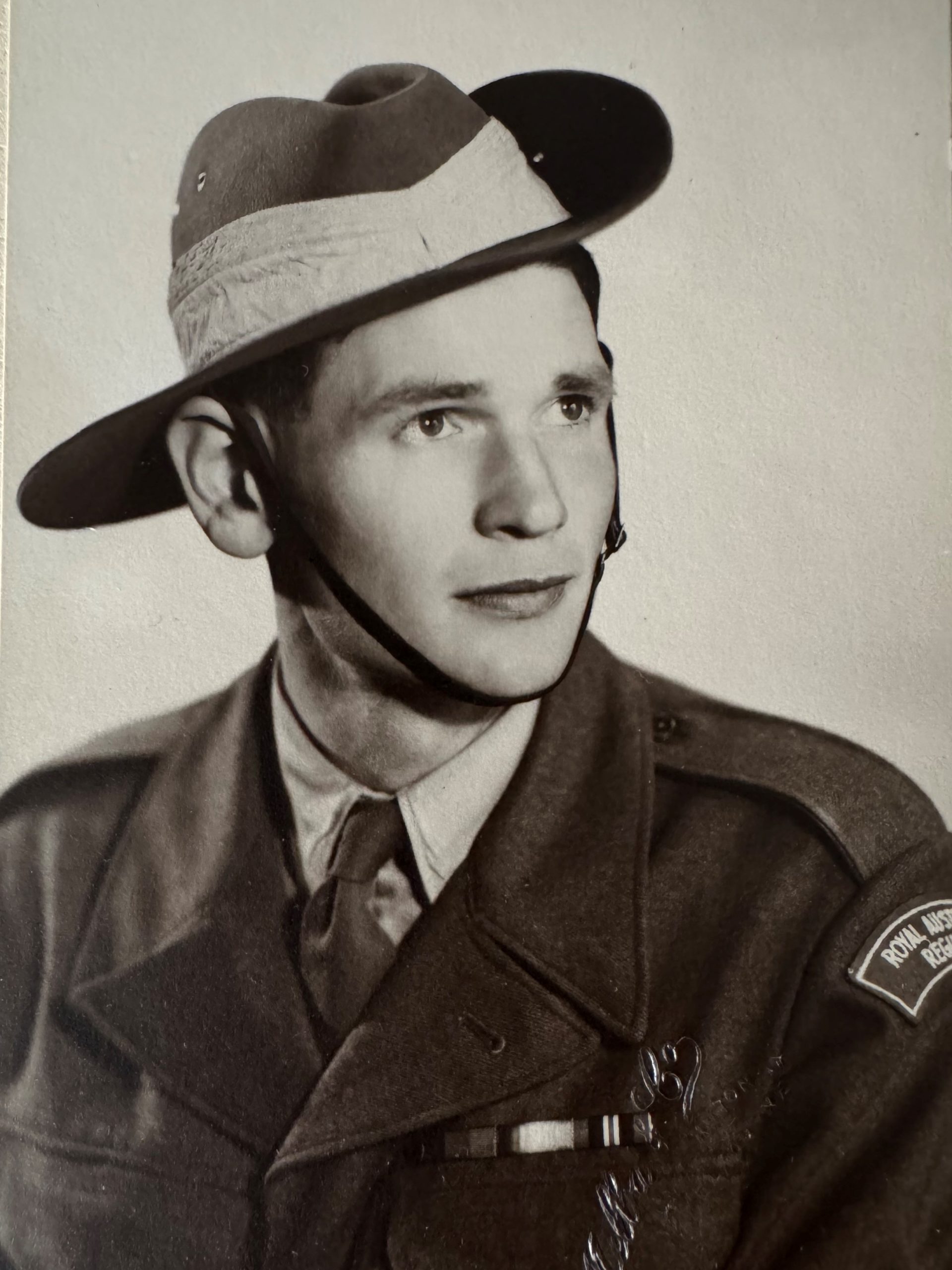
In mid-December 2024 I learned the sad news of the death of my friend Richard Hendy. Our friendship alas goes back less than two years, a very short time in his long life. We met after he wrote to me in response to a letter in the Bristol Evening Post in early 2023, and later the newspaper published his memoirs. Richard was born on 15 March 1926 and had he lived until next March 2025 he would have been 99 years old.
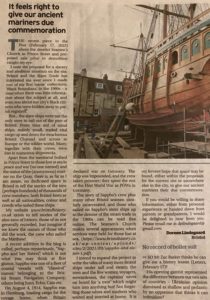 My suggestion was that the derelict Seaman’s Church in Prince Street should be used to commemorate the many merchant seamen of Bristol’s thousand-year maritime past.
My suggestion was that the derelict Seaman’s Church in Prince Street should be used to commemorate the many merchant seamen of Bristol’s thousand-year maritime past.
My idea fell on deaf ears – there was just one reply. An envelope containing a hand-written letter, an event in itself, plopped through my letterbox, a few days later. It was obvious that “R. Hendy” a former merchant seaman, had gone to the trouble of finding out my postal address, but what struck me most was his age. I am used to being the oldest person in the room, but I was astonished that he was eleven years older than me, having been at sea as a teenager – during WW2 at that – when I was still at infants’ school. We spoke by phone and soon after met face to face in his immaculate living room. He was a neat and dapper man, who looked so sprack that he could have passed for twenty years younger than his 97 years. He was quietly spoken with no real hint of accent. (However, one revelation from the funeral eulogies told that he could put one on when required! Ashore in New York, Richard is alleged to have addressed a bewildered shop assistant, “Cust thee sell I a shirt?” perhaps mimicking one of his shipmates?) When I met him he came across as a man of few words rather than a natural raconteur. However, the family told of how he always loved telling good yarns and knew something about everything including nuclear physics and birdwatching. He revealed no skeletons however innocent. He saw his adventures as not particularly interesting, more “just a job of work.” I had to tease them out. Though he did say more than once, “I’ve had a wonderful life.”
What did your Mum & Dad make of you going to sea at sixteen? I asked. “Not a lot,” he replied. His dual response to my next question, why the Merchant Navy, was thoughtful “I didn’t fancy killing anybody.” And after a pause, pragmatic. “I would have been called up sooner or later anyway.” Of North Atlantic convoys, with the Norwegians: “Hairy stuff. But I got away with it.” He would not be drawn to my probing about why in later years he jumped ship and joined the Australian Army in the middle of the Korean War. Surely the Frying Pan into the Fire? The last resort of a scoundrel? Perhaps. Maybe somebody else knows the answer to the “why” of this one. But again, “Not a scratch”, he said, cheerfully, more impressed by going home from Oz in a liner, his once and only time as a passenger. A brilliant photo of him in his Army uniform was displayed at the funeral (see above). He said he only had one photo, part of a gang of mates aboard the Tilapa, the first banana boat to come into Bristol after the war. But he did show me his seaman’s paybooks from which he had compiled, with the help of his devoted neighbours, Pete and Lyn, a list of his ships, the dates and destinations. As to what he did ashore – that was another mystery – “Sleep, mostly,” and as to the names of his shipmates he said he couldn’t remember them. I forget names myself these days, so I can forgive him that. I began to think – and hope – that he was immortal.
The funeral brought me a few surprises. I should have listened to Shakespeare. “A man in his life plays many parts.” We had only talked about the sea. Ashore he had worked inside, floor laying in pubs and such, as a hospital orderly, then receptionist, but preferred the outdoors, became a ranger on the Downs, even a guide on the Matthew. I would have thought that would have been worth a mention. I knew that for a long time he had a partner, “My cousin died, and I took over his lady,” he said. He looked after her for years, even after she suffered Alzheimer’s though sadly eventually, she needed specialist care. He still rode a bike – but “only to get my paper.” I knew he had a sister, a year his senior, who he visited on a weekly basis, “doing her odd jobs”. I heard he was nifty up a ladder but in latter years waited for his neighbours to go out before he went up the steps (lest they be worried for his safety) . It was a pleasure to meet sister Ruth and her family to whom Richard was “Uncle Ricky”.
My son Kevin who accompanied me to the funeral had previously recorded Richard’s death on the website. I received an email response from a young man called Kyle Gardner:
“I was very sad to hear this news. I’m 17 years old and I’m very interested in my family history. Just today (15/12/2024) I came across a photo of my great grandfather, Raymond Pearce, with Richard Hendy and one of their other friends, Len Dibbs. The occasion of the photo was Merchant Navy Day on 3rd September 2002. My great grandfather enlisted in the Merchant Navy sometime between 1940 and 1943 when he would have been aged between 15 and 18 years old. Rest In Peace, Richard.”

“Len, Richard and Kyle’s great grandfather Raymond. On the back of the photo it says that Raymon and Len first met Richard in May 1943 when they were all on SS Tanafjord.”
All three were with the Norwegians. They survived, though Len was torpedoed. Theirs will be an ongoing quest. We do not make enough fuss about the brave men who, aboard their unarmed vessels kept this country going throughout the war with food, raw materials and fuel. It is sad that Kyle did not meet Richard before he died, but I was glad that he could come to the funeral. We will try to keep the flame burning together.
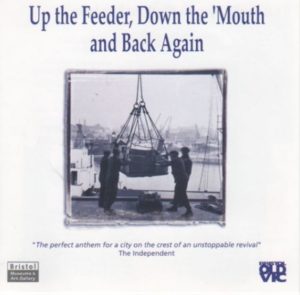 The funeral took place on 30 December 2024, and during the next two days I had my own private wake. On New Year’s Eve I played the CD of Bristol Old Vic’s “Up the Feeder, Down the Mouth”, about Bristol docks, arguably their best ever production, which will never be reprised, to quote from a recurring theme in the show itself, lampooning the City Fathers, “Too Expensive!” Then on New Year’s Day quite by chance I heard a semi-documentary radio broadcast about the Penlee Lifeboat tragedy of 1981 called Solomon Browne. You would have to be a hard person not to cry. I cried. And throughout the day the BBC celebrated one hundred years of the Shipping Forecast which has fascinated me since I was a child, when a Gale Warning would be announced in sombre tones on the radio “South Cones are being hoisted at Viking, North Utsire, South Utsire, Dogger, German Bight…….” I never knew then what South Cones were, but I imagined them flying, the warning system devised by the great Robert Fitzroy in 1861 to save lives round our coast. Fitzroy has his own sea area now, aptly next to Trafalgar. A pity we lost Finisterre though, it just means “Lands’ End” but “off Finisterre” sounds more mysterious, and somehow you imagine the fog, and a vessel coming through out of the murk. Our sea areas have the ring of glorious poetry, Sole, Lundy, Irish Sea, Shannon, Rockall, Malin……I remember how George, Kevin and I walked out to Malin Head a few years ago and were buffeted by the force of the wind. You could not help but think of “those in peril on the sea.”
The funeral took place on 30 December 2024, and during the next two days I had my own private wake. On New Year’s Eve I played the CD of Bristol Old Vic’s “Up the Feeder, Down the Mouth”, about Bristol docks, arguably their best ever production, which will never be reprised, to quote from a recurring theme in the show itself, lampooning the City Fathers, “Too Expensive!” Then on New Year’s Day quite by chance I heard a semi-documentary radio broadcast about the Penlee Lifeboat tragedy of 1981 called Solomon Browne. You would have to be a hard person not to cry. I cried. And throughout the day the BBC celebrated one hundred years of the Shipping Forecast which has fascinated me since I was a child, when a Gale Warning would be announced in sombre tones on the radio “South Cones are being hoisted at Viking, North Utsire, South Utsire, Dogger, German Bight…….” I never knew then what South Cones were, but I imagined them flying, the warning system devised by the great Robert Fitzroy in 1861 to save lives round our coast. Fitzroy has his own sea area now, aptly next to Trafalgar. A pity we lost Finisterre though, it just means “Lands’ End” but “off Finisterre” sounds more mysterious, and somehow you imagine the fog, and a vessel coming through out of the murk. Our sea areas have the ring of glorious poetry, Sole, Lundy, Irish Sea, Shannon, Rockall, Malin……I remember how George, Kevin and I walked out to Malin Head a few years ago and were buffeted by the force of the wind. You could not help but think of “those in peril on the sea.”
I am saying goodbye to Richard with Herman Melville’s words from “Moby Dick”:
Let me square the yards while we may, old man, and make a fair wind of it homeward.
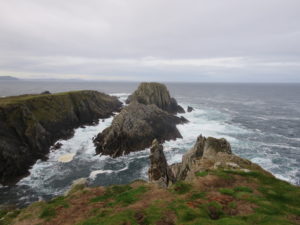
Malin Head on probably what was a very calm day – Plenty windy for me though!
(Richard’s story appears here and an abridged version is in “Bristol Times” (Bristol Post) 20.12.2024. He said kindly, after the latter appeared, “You have made me famous!”)


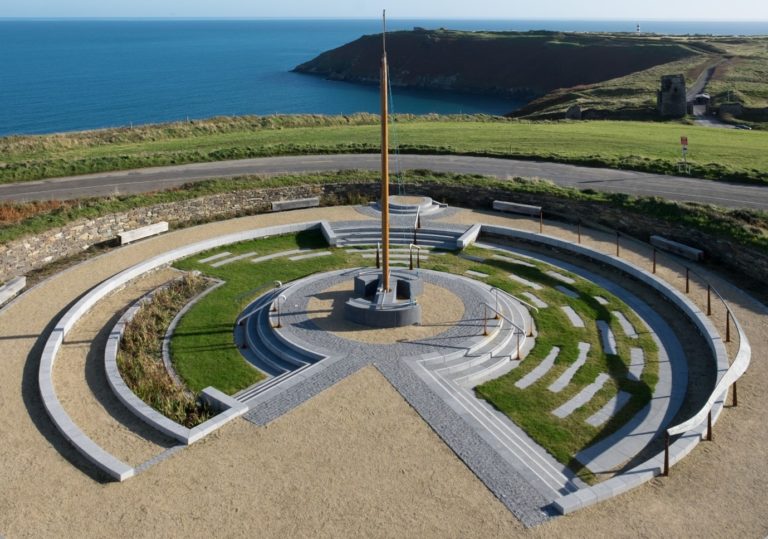
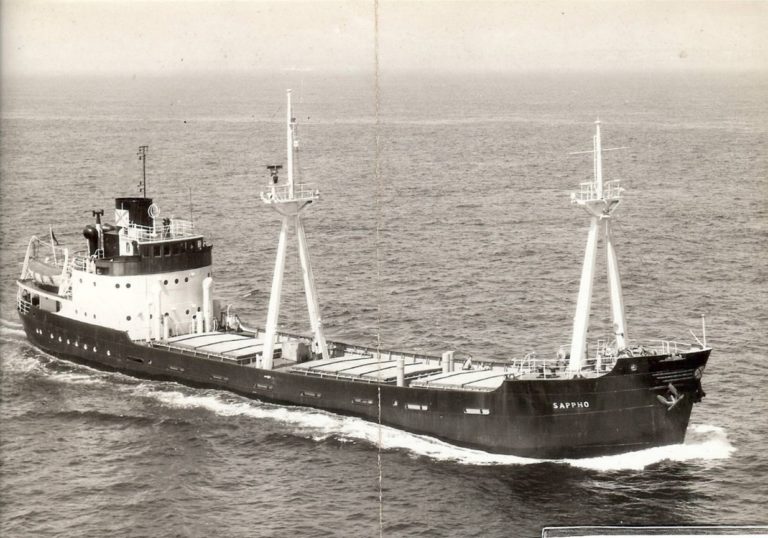

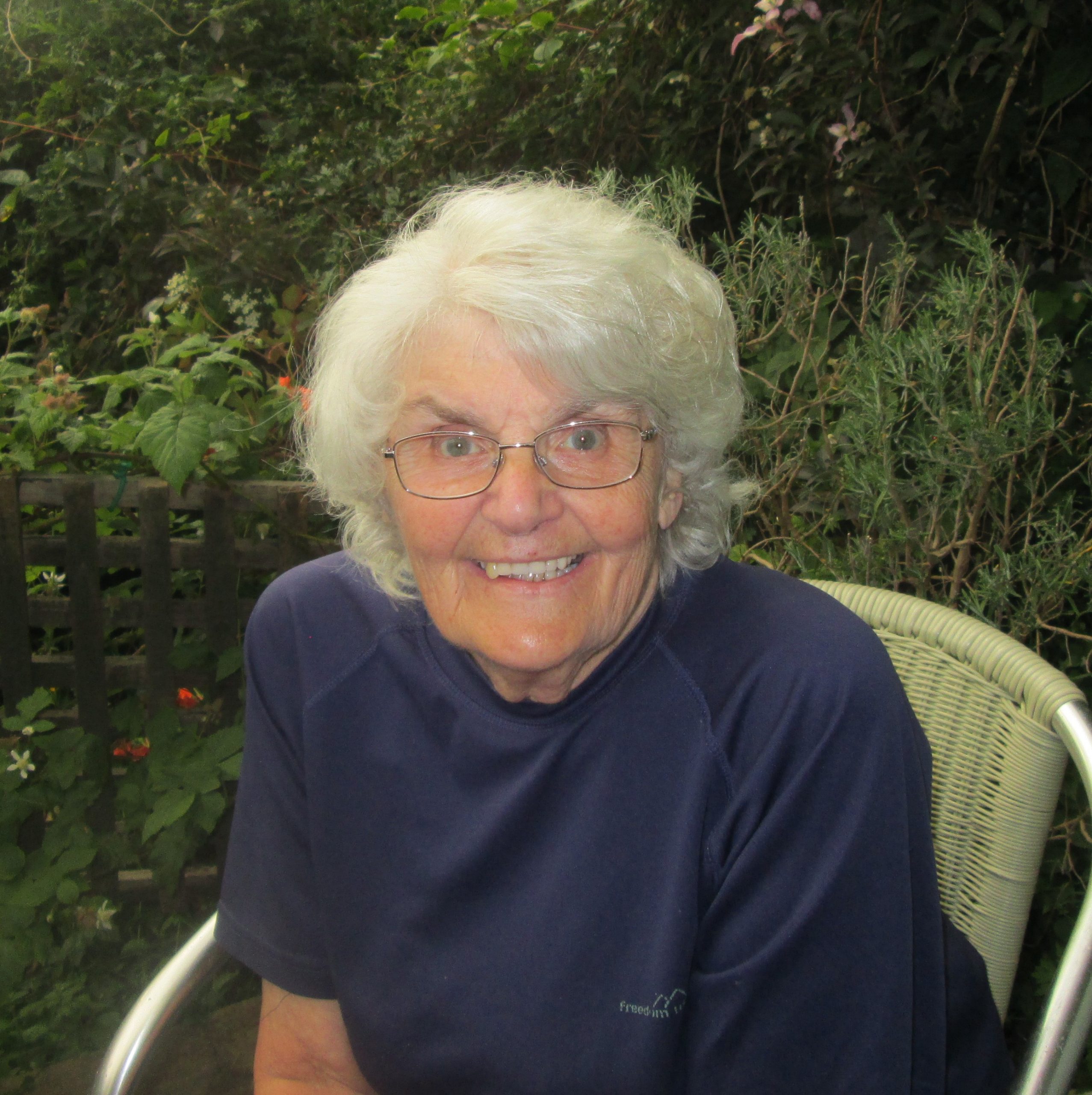



Blog Comments
Kyle
15th December 2024 at 4:13 pm
I was very sad to come across this news. I’m 17 years old and I’m very interested in my family history. Just today (15/12/2024) I came across a photo of my great grandfather, Raymond Pearce, with Richard Hendy and one of their other friends, Len Dibbs. This occasion of the photo was Merchant Navy Day on 3rd September 2002. My great grandfather enlisted in the Merchant Navy sometime between 1940 and 1943 when he would have been aged between 15 and 18 years old. Rest In Peace, Richard.